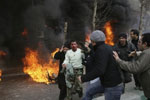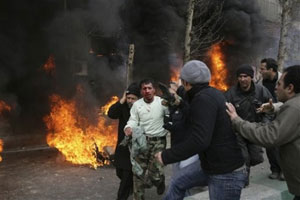 The Guardian: More than 5,000 Iranians have been arrested since disputed elections last year, with many subjected to torture, says report.
The Guardian: More than 5,000 Iranians have been arrested since disputed elections last year, with many subjected to torture, says report.
The Guardian
More than 5,000 Iranians have been arrested since disputed elections last year, with many subjected to torture, says report
Ian Black, Middle East editor
 Concerns about Iran’s nuclear programme should not prevent international action over human rights abuses by the Islamic regime since last year’s disputed election, Amnesty International warns today.
Concerns about Iran’s nuclear programme should not prevent international action over human rights abuses by the Islamic regime since last year’s disputed election, Amnesty International warns today.
Cataloguing intensifying repression by the regime and its shadowy intelligence services, Amnesty also calls for a “concerted and robust response towards the failure of the Iranian authorities to address human rights concerns”. Its report, From Protests to Prison, says at least 5,000 people have been arrested since the mass protests that erupted a day after Mahmoud Ahmadinejad claimed victory over Mir Hossein Mousavi, the Green movement leader, in the disputed presidential election of 12 June last year.
Torture, beatings, rape and solitary confinement have all been used, with hundreds sentenced after unfair trials to lengthy prison sentences. “Unlawful killings and all too frequent reports of torture and other ill-treatment by state actors who enjoy near total impunity are still not being investigated,” Amnesty says.
Claudio Cordone, Amnesty’s interim secretary general, said: “The Iranian government is determined to silence all dissenting voices while at the same time trying to avoid all scrutiny by the international community into the violations connected to the post-election unrest.”
Amnesty documents show how new laws criminalise website use and contact with more than 60 foreign institutions, media organisations and NGOs. Newspapers have been closed down, websites and email services filtered or blocked.
Political activists, journalists, film-makers, students, human rights defenders and lawyers have all been arrested. Action has also intensified against already banned groups such as monarchists, Bahá’ís and the People’s Mujahideen.
Arbitrary arrest, detention without trial, disappearances, torture and forced confessions are extensively documented. So far this year, 115 people have been executed. Iran has one of the highest rates of executions in the world.
Women in detention have frequently reported sexual insults and threats of rape. Zahra Kamali told Amnesty her interrogators taunted her with wanting to sleep with other men, and sometimes touched her breasts. An unnamed woman activist reported having cables attached to her nipples and given electric shocks.
“Threats against family members, especially mothers, wives and daughters, are a potent means of pressuring detainees to comply with their interrogators’ demands,” the report says. “Detainees who may have already experienced torture and other ill-treatment are faced with the fear of similar treatment being meted out to their loved ones.”
In the one 15-minute meeting Arash Rahmanipour had with his lawyer after he was sentenced to death and before his execution, he said he had falsely “confessed” after his pregnant sister was threatened with harm in front of him. His sister later miscarried after her release.
“Confessions” all bear a striking resemblance, the report says. Individuals in show trials are shown “confessing” to contacts with foreigners, which is often interpreted as espionage, usually for the US or UK. The individuals usually state that they had been “misguided” and express repentance for their alleged “crimes”. There are reports that some may have been drugged before making confessions.
Amnesty also condemns “politically motivated executions” which have taken place before key anniversaries when mass protests are expected. At least six people remain on death row charged with “enmity against God” for their alleged involvement in demonstrations and membership of banned groups.
Iranians living in exile, in Turkey and elsewhere, have been subject to threats. Nobel Peace Laureate Shirin Ebadi, who has received many death threats, was out of the country at the time of the election and has not felt safe enough to return.
Abolfazl Fateh, former head of Mousavi’s information committee, and a student in the UK, has reportedly received death threats from individuals claiming to be working for the Iranian ministry of intelligence.


